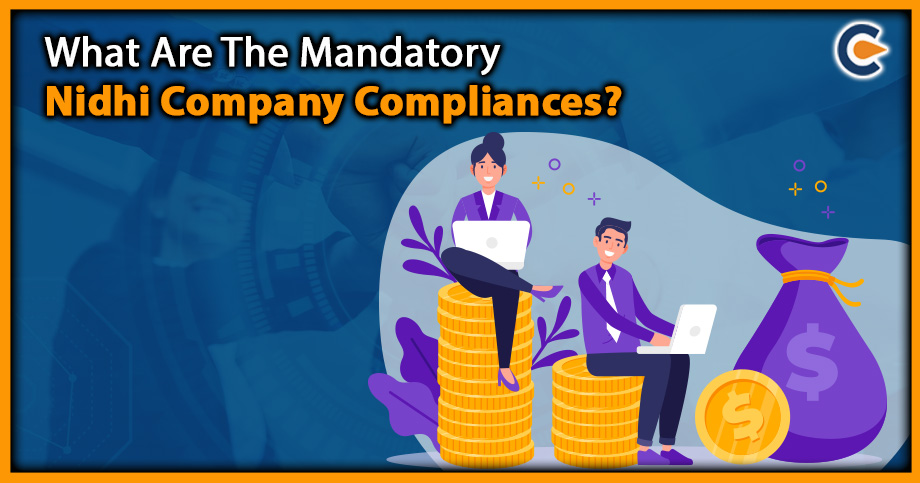In accordance with Section 406 of the Companies Act of 2013, a “Nidhi” is a company that has been registered as a Nidhi to promote the practice of bartering and cash reserves among its representatives, has only received deposit accounts from its representatives and loans to them for their mutual benefit, and complies with the rules set forth by the Central Government for the regulatory oversight of such a lesson of businesses. In this blog, we will discuss some important Tax Exemption for Nidhi Company.
Some Important Tax Exemption for Nidhi Company
Following is the list of all the Tax Exemption for Nidhi Company
- Exemptions for Nidhi Businesses Documents Must Be Served On Nidhi Members
[Section 20] (Tax Exemption for Nidhi Company):
Any person may receive documentation as required by sub-section (2) of section 20 of the Companies Act of 2013 by having it sent to him via mail, registered post, speed post, or having it brought to his place of employment / residence, digital transmission or other manner that may be specified.
A member may ask for any document to be provided to him in a certain format, but he must pay the fees decided by the business at its annual general meeting (A.G.M.). With the exception that the documentation may only be provided to individuals who own shares with a total price of more than 1,000 Rupees or more than 1% of the Nidhis’ total paid shareholding, (whichever less). Other Nidhi owners may be made aware of the announcement by posting a Public Notice on Nidhi’s bulletin board and publishing it in a publication circulated in the area where the Nidhi’s Registered Office is located.
- Exemptions under Nidhi’s Private Placement [Section 42] (Tax Exemption for Nidhi Company):
Section 42(2) – During the fiscal year, a Nidhi Company may make shares or a request to subscribe to shares available to any number of individuals. So long as it doesn’t count as a public offer, a Nidhi Company is allowed to make private placements to any number of people.
Section 42(3) – Even if the firm has withdrawn or rejected past requests, the allocations for those requests have been met, and Nidhi Company may make a new offer or open invitation under section 42.
Section 42(5) – Cash subscription payments are accepted by Nidhi Company. Other businesses should be aware that other forms of payment, such as checks or promissory notes, must be used to pay for subscriptions to securities and not Cash. Nidhi Company does not require someone to identify themselves before offering them a leveraged buyout.
Nidhi is not covered by Section 42(7) of the CA 2013; hence the Nidhi company can offer private placement to any individual without recording their name and there is no need to give the Registry any information.
- Nidhi Members’ Voting Rights [Section 47] (Tax Exemption for Nidhi Company):
Every member of a limited company who owns joint equity capital is entitled to one vote on each proposal presented before the business in accordance with the requirements of subsection (1) of section 47 of the Companies Act of 2013. The amount of his political participation in a referendum is determined by his portion of the paid-up equity securities of the corporation. However, if their voting rights surpass 5% of the total absolute voting rights of equity owners, no Nidhi firm member may vote. As a result, any Nidhi company member will be able to cast an unlimited number of votes on each resolution that is put before the corporation.
Additional share issue [Section 62]:
If authorised by a special resolution, a corporation may extend its subscription capital by issuing additional shares to be given to stockholders, employees, and other persons. In the case of Nidhi, corporations may issue additional shares to anyone without obtaining shareholder approval because they are exempt from section 62.
- Limitations On A Company’s Acquisition of Its Shares / The Provision of Loans for the Acquisition of Its Shares [Section 67] (Tax Exemption for Nidhi Company):
According to subsection (1) of the CA 2013, a corporation limited by shares and holding a shareholding is not permitted to purchase its interests until the share capital is decreased in accordance with the provisions of this Act. A member who no longer serves as a creditor or lender may sell their stock to a Nidhi business after receiving this notice. In accordance with Section 66 of the 2013 Companies Act, the acquisition will not be considered a decrease in capital. A firm is not allowed to borrow money to buy its own shares under Section 67.
As stated in sub-section (1) of the CA 2013, a corporation limited by shares and having a share capital shall not be permitted to purchase its interests prior to the shareholding being decreased in accordance with the terms of this Act. After this notification, a Nidhi firm may purchase an interest from a member who no longer qualifies as a small investor or lender. In accordance with Section 66 of the 2013 Companies Act, the transaction shall not be regarded as a capital reduction.
- Penalties For Failing To Distribute Dividends [Section 127]:
If a corporation announces a payout but fails to pay it or post the warrants within 30 days of the announcement, where a participant’s remuneration must be one hundred rupees or less, then every member and the firm are liable. This is in accordance with section 127 of the Companies Act of 2013. However, it will be sufficient compliance with the requirements of clause 127 of the Companies Act of 2013[1] if the statement of earnings is published in one daily newspaper with wide distribution in the national language and the public notice of the said proclamation is also displayed on the bulletin board of the Nidhis for at least one month.
Other relevant Tax Exemptions for Nidhi Company
The following are some relevant Tax Exemptions for Nidhi Company:
| 1 | Section 20 | The only members who may receive the document in the event of a Nidhi are those who own shares with a face value greater than 1,000 rupees or shares that account for more than 1% of the Nidhis’ total paid-up share capital, whichever is smaller. A public notice in a newspaper distributed in the neighbourhood where the Nidhi’s registered office is located, along with posting of the notice on the Nidhi’s notice board, may be used to serve documents to other shareholders. |
| 2 | Section 47(1) (b) | will apply, with the restriction that no member may vote more than 5% of the total voting rights of equity owners in each poll. |
| 3 | Section 62 | does not apply on Nidhi Company |
| 4 | Section 123 (5) | shall be subject to the adjustment that any dividend payable in cash may be paid by crediting the same to the member’s account if the dividend is not claimed within 30 days of the dividend declaration. |
| 5 | Section 127 | Subject to the modification, where the dividend payable to a member is less than 100 rupees, it shall be enough compliance with the provisions of the section if the announcement of the dividend declaration is made in the local language in one local newspaper of general circulation and is also posted on the notice board of the Nidhis for at least three months. |
| 6 | Section 136(1) | Subject to the modification that it will be sufficient compliance with the provisions of the section in the case of members who don’t individually/jointly hold shares of more than $1,000 in face value/more than 1% of the total paid-up share capital, whichever is less, if an announcement is made by public notice in a newspaper distributed in the district where the Registered Office of the Nidhi is situated stating the date, time & place of the meeting. |
| 7 | Section 160 (1) | the words “ten thousand rupees” for the terms “one lakh rupees” for the deposit to be made to stand for directorship. |
| 8 | Section 197 | With the following exceptions: (a) the absence of a managing director, full-time director, or manager in a Nidhi; (b) if the total compensation given to all Nidhi directors during a fiscal year is less than fifteen lakh rupees or ten percent of such Nidhi’s net income; and (c) if a remuneration paid under subsection (b) is authorised by a special resolution made in this regard |
| 9 | Section 403 | applies with the exception that the filing fees for each return of allocation made in accordance with subsection (9) of section 42 shall not exceed the normal filing fee payable and shall be calculated at the rate of one rupee for every one hundred rupees or fractions thereof on the face value of the shares included in the return. |
Conclusion
Nidhi has been organised to accept deposits from and lent money to its representatives for their mutual benefit, to foster the practise of cash reserves and bargain hunting among its representatives, and complies with the regulations established by the Central Government for the regulatory oversight of such a lesson of businesses. The paperwork costs for each exchange of allocation under sub-section (9) of section 42 of the CA 2013 shall be calculated at a rate of One Rupee per one hundred rupees or portions thereof on the head value of the stock included in the compensation. However, they may not raise the maximum amount of the normal processing fee payable.
Read Our Article: What Is Nidhi Company? Know It’s Registration Procedure











